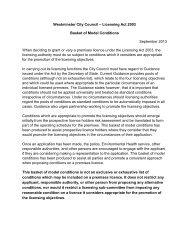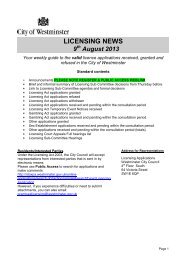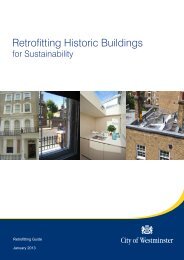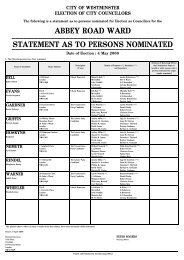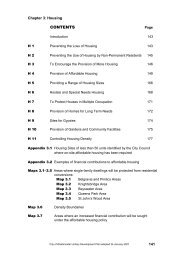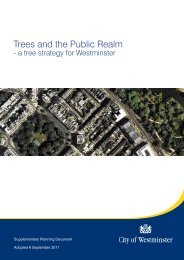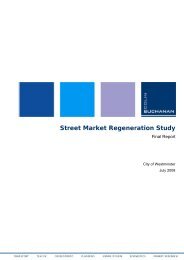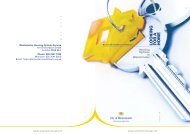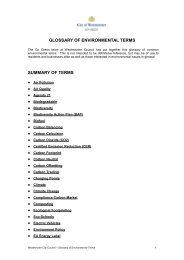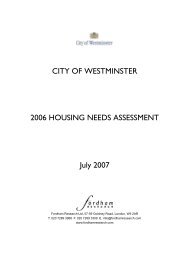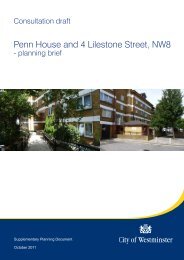Amended guidance issued under section 182 of the Licensing Act ...
Amended guidance issued under section 182 of the Licensing Act ...
Amended guidance issued under section 182 of the Licensing Act ...
You also want an ePaper? Increase the reach of your titles
YUMPU automatically turns print PDFs into web optimized ePapers that Google loves.
EFFECT OF SPECIAL POLICIES13.29 The effect <strong>of</strong> adopting a special policy <strong>of</strong> this kind in <strong>the</strong> licensing policy statement is tocreate a rebuttable presumption that applications for <strong>the</strong> grant or variation <strong>of</strong> premiseslicences or club premises certificates which are likely to add to <strong>the</strong> existing cumulativeimpact will normally be refused or subject to certain limitations, following relevantrepresentations, unless <strong>the</strong> applicant can demonstrate in <strong>the</strong> operating schedule that <strong>the</strong>rewill be no negative cumulative impact on one or more <strong>of</strong> <strong>the</strong> licensing objectives. Applicantsshould give consideration to potential cumulative impact issues when setting out <strong>the</strong> steps<strong>the</strong>y will take to promote <strong>the</strong> licensing objectives in <strong>the</strong>ir application.13.30 However, a special policy must stress that this presumption does not relieve responsibleauthorities (or any o<strong>the</strong>r persons) <strong>of</strong> <strong>the</strong> need to make a relevant representation, referringto information which had been before <strong>the</strong> licensing authority when it developed itsstatement <strong>of</strong> licensing policy, before a licensing authority may lawfully consider giving effectto its special policy. If <strong>the</strong>re are no representations, <strong>the</strong> licensing authority must grant <strong>the</strong>application in terms that are consistent with <strong>the</strong> operating schedule submitted.13.31 Once adopted, special policies should be reviewed regularly to assess whe<strong>the</strong>r <strong>the</strong>y areneeded any longer or need expanding.13.32 The absence <strong>of</strong> a special policy does not prevent any responsible authority or o<strong>the</strong>r personmaking representations on an application for <strong>the</strong> grant or variation <strong>of</strong> a licence on <strong>the</strong>grounds that <strong>the</strong> premises will give rise to a negative cumulative impact on one or more <strong>of</strong><strong>the</strong> licensing objectives.13.33 Special policies may apply to <strong>the</strong> impact <strong>of</strong> a concentration <strong>of</strong> licensed premises sellingalcohol for consumption on or <strong>of</strong>f <strong>the</strong> premises. When establishing its evidence base forintroducing a special policy, licensing authorities should be considering <strong>the</strong> contribution tocumulative impact made by different types <strong>of</strong> premises within its area, in order to determine<strong>the</strong> appropriateness <strong>of</strong> including different types <strong>of</strong> licensed premises within <strong>the</strong> special policy.LIMITATIONS ON SPECIAL POLICIES RELATING TO CUMULATIVE IMPACT13.34 A special policy should never be absolute. Statements <strong>of</strong> licensing policy should alwaysallow for <strong>the</strong> circumstances <strong>of</strong> each application to be considered properly and forapplications that are unlikely to add to <strong>the</strong> cumulative impact on <strong>the</strong> licensing objectives tobe granted. After receiving relevant representations in relation to a new application for or avariation <strong>of</strong> a licence or certificate, <strong>the</strong> licensing authority must consider whe<strong>the</strong>r it wouldbe justified in departing from its special policy in <strong>the</strong> light <strong>of</strong> <strong>the</strong> individual circumstances <strong>of</strong><strong>the</strong> case. The impact can be expected to be different for premises with different styles andcharacteristics. For example, while a large nightclub or high capacity public house might addto problems <strong>of</strong> cumulative impact, a small restaurant or a <strong>the</strong>atre may not. If <strong>the</strong> licensingauthority decides that an application should be refused, it will still need to show that <strong>the</strong>grant <strong>of</strong> <strong>the</strong> application would <strong>under</strong>mine <strong>the</strong> promotion <strong>of</strong> one <strong>of</strong> <strong>the</strong> licensing objectivesand that appropriate conditions would be ineffective in preventing <strong>the</strong> problems involved.106 AMENDED GUIDANCE ISSUED UNDER SECTION <strong>182</strong> OF THE LICENSING ACT 2003



